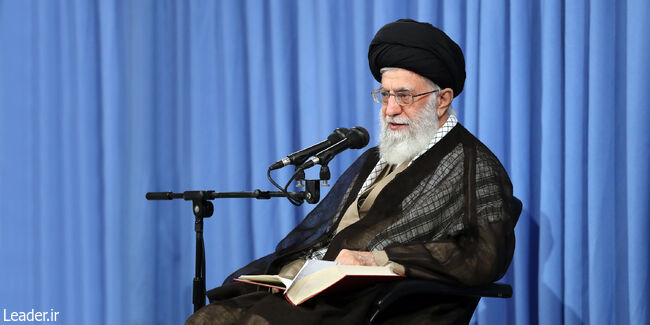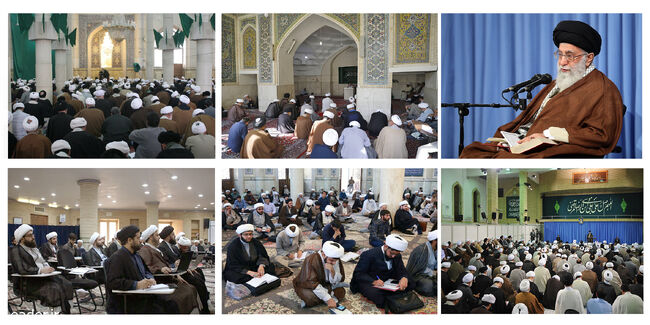In a message to the conference marking the “Centenary of the Reestablishment of the Qom Seminary”, the Leader of the Islamic Revolution, Ayatollah Khamenei, outlined the elements and diverse functions of the seminary. He discussed the necessities for achieving a pioneering and leading seminary, which he characterised as being innovative, dynamic, up-to-date, responsive to emerging issues, morally refined, having a spirit of progress and struggle, a revolutionary identity, and the capacity to design systems for societal governance. He stressed that the seminary’s paramount duty is clear communication (balāgh al-mubīn), a prime example of which is delineating the primary and secondary principles of the new Islamic civilisation, articulating its vision, and promoting its cultural foundations in society.
At the beginning of his message, the Leader of the Islamic Revolution recounted the history of the establishment of the blessed seminary of Qom during the great turbulent events that marked the dawn of the fourteenth solar Hijri century. He highlighted the pivotal role of Ayatollah Sheikh Abdul Karim Haeri in founding, sustaining, and fostering the seminary's growth. He said, “A great honour of the seminary of Qom is that a luminous figure like Imam Khomeini emerged from it. Within less than six decades, the spiritual and popular credibility (of the seminary) was elevated to such an extent that it was, with the hands of the people, able to uproot the treacherous, corrupt, and sinful monarchical regime and, after centuries, restore Islam to the position of political leadership in the country.”
Ayatollah Khamenei emphasised that the seminary is not merely an institution for teaching and studying but a comprehensive entity encompassing knowledge, education, and social and political activity. He outlined key topics that can truly make the seminary a pioneering and leading institution.
In explaining the first key principle, he described the seminary of Qom as a centre holding the immense scholarly wealth of Shiism, a product of the intellectual endeavours and research of thousands of religious scholars in fields such as jurisprudence, theology, philosophy, Qur'anic exegesis, and hadith over the course of a thousand years.
Referring to the complex and numerous phenomena in human life and the unprecedented questions that contemporary jurisprudence must be prepared to address, the Leader of the Revolution said, "Today, with the establishment of the Islamic political system, the primary question is how the divine Lawgiver (Shāriʿ) views the individual and social dimensions of human life and its fundamental principles. A jurist's (faqīh's) ruling on any issue must reflect part of this comprehensive outlook."
Ayatollah Khamenei mentioned that one of the key duties of the seminary, as a valuable scholarly centre with a thousand-year legacy, is to address issues related to Islamic governance and the management of society. He said, "Issues such as the relationship between the government and the people, the relations with other states and nations, the principle of rejecting (foreign) domination (nafy-e sabeel), the economic system and the foundation of the principles of the Islamic order, the origin of governance from the Islamic perspective and the role of the people in it, taking positions on critical issues and confronting the hegemonic world order, the concept and essence of justice, along with dozens of other fundamental and sometimes critical topics are some of the issues that require a jurisprudential response."
In elaborating on the second principle of a pioneering and leading seminary, he said that the seminary is an outward-looking institution whose output at all levels serves the thought and culture of society and humanity. He identified the most important duty of the seminary as clear communication and noted that fulfilling this duty requires cultivating refined and efficient human resources.
The Leader of the Islamic Revolution described the scope of clear communication as encompassing a vast spectrum, ranging from sublime monotheistic teachings to personal religious obligations, and from explaining the Islamic system (its structure and duties) to lifestyle matters, environmental protection, and other aspects of human life. He emphasised that one of the shortcomings of the seminary is the mismatch between the parameters and dimensions of its religious propagation and the intellectual and cultural realities among the people, especially the youth. He said, "Hundreds of articles, magazines, speeches at gatherings, and television programs produced by the seminary cannot fulfil the duty of clear communication, neither to the extent required nor as deserved when faced with this deluge of deceptive indoctrination."
Ayatollah Khamenei stated that the proper fulfilment of the duty of clear communication in the seminary requires two key elements: education (ta'līm) and moral refinement (tahdhīb). He said, "Delivering a relevant message, filling gaps, and purposefully aligning with religion's objectives requires education and training. It is essential to teach seminarians strong persuasive methods, familiarise them with the techniques of dialogue, and make them aware of how to engage with public opinion, the media, and virtual spaces, as well as how to be disciplined in their engagement when confronted with opposing views. Only through practice and persistence can they be prepared to enter this field."
He emphasised that taking a proactive, even assertive stance in the field of propagation is more important than a defensive one. He added, "To achieve this goal, the seminary must train cultural warriors. Along with cultivating such individuals, it must also focus on preparing cadres for specialised roles within the governing system and in administrative functions in the country, as well as in organising the internal structure of the seminary itself."
The Leader of the Revolution identified "recognising, preserving, and strengthening the seminary's 'jihadi identity' as the third pillar of a pioneering and leading seminary." He referred to Imam Khomeini's (r.a.) profoundly meaningful and stirring message addressed to the clergy at the end of the year 1367 (1989). In that historic message, Imam Khomeini (r.a.) characterised the clergy as vanguards in the arena of jihad, defenders of both the homeland and the oppressed, while simultaneously expressing grave concern that the forces of narrow-mindedness and pseudo-sanctimony might tempt the seminary toward separating religion from politics and social activities thereby obstructing the correct path of progress.
Ayatollah Khamenei stated that the late Imam had this concern due to a dangerous tendency among some seminarians and others to view the seminary's involvement in fundamental concerns affecting the people, its engagement in social and political activities, and its struggle against oppression and corruption as conflicting with the sanctity of religion. This tendency invites the clergy to adopt a stance of total pacifism and to avoid taking the risks associated with political involvement.
He emphasised that the sanctity of religion is most evident in the arenas of intellectual, political, and military struggle. It is also consolidated by the self-sacrifice and jihad of those who carry the teachings of religion, and the shedding of their pure blood. Therefore, in order to preserve its spiritual credibility and remain faithful to its foundational philosophy, the seminary must never detach itself from the people, society, and its fundamental concerns. It should consider jihad, in all its forms, when necessary, as its definite duty.
The Leader of the Revolution identified participation in production and the formulation of social governance systems as the fourth key element of a pioneering and leading seminary. He said, "The seminary must address this gap, because it is an essential duty. Today, jurisprudence cannot be perceived, as some uninformed individuals do, as being solely confined to individual and devotional rulings, because 'ummah-building jurisprudence' is not confined to acts of worship and personal obligations."
Ayatollah Khamenei stated that the seminary must become familiar with global findings and collaborate with universities to design and organise social systems.
He identified the fifth key element of a pioneering and leading seminary as groundbreaking civilising advancements within the framework of Islam's universal message. He said, "The most prominent expectation from the seminary is to pave the way for the establishment of Islamic civilisation, one in which science and technology, human and natural resources, all human capabilities, political power, military might, and everything at humanity's disposal are employed in the service of social justice, public welfare, reducing class disparities, enhancing spiritual growth, elevating scientific knowledge, deepening the understanding of nature, and strengthening faith."
The Leader of the Revolution described Islamic civilisation as the antithesis of this current defective materialistic civilisation. He pointed out, "This false civilisation is destined to vanish according to the immutable laws of creation. It is our duty to aid in dismantling this falsehood and, in both thought and practice, lay the foundation for an alternative civilisation. The seminary bears a critical responsibility in this regard, primarily, to outline the foundational and subsidiary principles of the new Islamic civilisation. This should be followed by explaining, promoting, and culturally integrating it within society. This effort represents one of the highest embodiments of clear communication."
Ayatollah Khamenei emphasised the importance of considering the elements of time and place in ijtihad (Islamic jurisprudential reasoning), cautioning against allowing new interpretations to distort or dilute the purity of the Shari'ah. Regarding the current state of the Qom Seminary, he said, "The presence of thousands of teachers, authors, researchers, writers, speakers, and thinkers in Islamic studies, the publication of scholarly and research journals, the writing of specialised and general articles, the significant number of thoughtful seminarians and scholars, their active participation in all revolutionary arenas, even in military fields, opening avenues for global outreach, training thousands of students from various nations, the attention of new-generation jurists to contemporary issues, the enthusiasm of young scholars for delving into the intellectual nuances of authoritative Islamic texts, particularly the Holy Qur'an, and the groundbreaking initiative of establishing women's seminaries, all demonstrate that the Qom Seminary is a vibrant and dynamic institution."
In the final part of his message, he focused on recommendations for realising a pioneering and leading seminary. Among the recommendations mentioned by the Leader of the Revolution were: the necessity of keeping the seminary up to date; prioritising the training of personnel across all sectors; strengthening the relationship between seminarians and the public; prudent management by seminary leaders to counter biased propaganda that discourages young seminarians about the future; maintaining an optimistic view of the younger generation and engaging constructively with them; designing seminary curricula based on: forward-looking, responsive, and up-to-date jurisprudence accompanied by clear philosophical foundations with social relevance, and eloquent, convincing theological discourse; cultivating the spirit of: asceticism, piety (taqwā), contentment (qinā’ah), independence from all but God, reliance on Divine Will (tawakkul), progress, and the readiness to strive (mujāḥidah).



